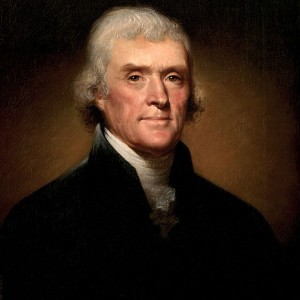Thomas Jefferson died on the 50th anniversary of his greatest achievement: authoring the Declaration of Independence. This July 4 is the 243rd anniversary of that achievement, and the 193rd anniversary of Jefferson’s death. John Adams died just five hours after Jefferson on the same day. His last words were about his friend, then adversary, then friend once more. “Thomas Jefferson survives,” he said moments before passing away himself.
By its 50th anniversary, the United States had moved past its infancy to become a functional, powerful nation. In the ensuing 193 years, the nation has become an undisputed military, economic and cultural superpower. But we would do well to remember not just how, but why we were founded. For Jefferson, the answer to that question was straightforward. “We hold these truths to be self-evident,” he famously wrote, “that all men are created equal, that they are endowed by their Creator with certain unalienable Rights, that among these are Life, Liberty and the pursuit of Happiness.”
Government, he asserted, exists to secure these rights, and nothing else. By the time the Framers of the U.S. Constitution got around to operationalizing the sentiments of the Declaration, they had made it quite clear that they feared government at least as much as they hoped for it to succeed. They designed a federal government with internal checks and balances that would limit what the government could accomplish, and, ultimately, with a Bill of Rights that would limit what the government could do to its citizens.
Jefferson saw the need for limitations on government from the first, and in the nation’s founding document stressed that “whenever any Form of Government becomes destructive of these ends, it is the Right of the People to alter or to abolish it,” and replace it with a better one.
Yet, how are we doing? Our lives are protected about as well as any government has protected its people in human history. How free we are, and the degree to which we are able to live self-directed lives is another matter entirely. Our government, designed to protect us so that we could lead lives of our choosing, has come to prevent us from leading lives of our choosing.
To borrow a model from psychology, our government has become the “devouring mother.” For the first 150 years of our existence, the federal government directed around 5 percent of the economy. This number jumped considerably during war years, but always settled back to around 5 percent. Over the past 90 years, that number has steadily risen to almost 25 percent in peace time. At the Founding, the federal government could impose only tariffs and excise taxes. Today, its revenue from tariffs and excise taxes is dwarfed by its revenue from income taxes, payroll taxes, corporate taxes and capital gains taxes.
For the first 150 years, federal regulations were so few that there was no central repository for recording them. Today, the official repository of regulations, the Code of Federal Regulations, exceeds 180,000 pages. The federal government, founded as a tool for securing our rights, has become a weaponized nanny that second guesses our every decision and controls our every move. Our country’s government has become not the one the Founders intended, but the one they feared.
Yet today, on America’s birthday, the hope of liberty is not extinguished, even if it is dormant. We have made tremendous strides in any number of directions, even as we ceded a good deal of our liberty to a government we should have feared all along. Thomas Jefferson’s words survive, and we celebrate them annually on this day. But it’s not enough simply to remember the words he wrote, even if they gave birth to a nation. It’s time to recapture a bit of his spirit.

